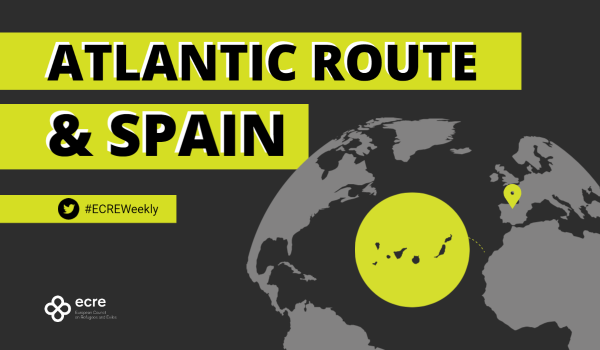The Atlantic route remains one of the deadliest migratory routes to Europe. The EU envisages the deployment of Frontex in Morocco and Spain resumes deportation flights from the Canaries. While 25,000 people have arrived from Ukraine and around 10,000 are already benefitting from the temporary protection scheme, the differences in treatment between displaced populations is evident.
Aid organisations report that there were more fatalities in the Atlantic in 2021 than ever before. According to the International Organization for Migration (IOM), at least 84 boat accidents were recorded on the Atlantic route in 2021, with 1,173 persons dead or missing – over three quarters declared dead. Individuals involved in the shipwrecks are mostly of Moroccan origin, followed by Malians, Senegalese and Guinean nationals. In contrast, the number of fatalities provided by the Spanish NGO Caminanfo Fronteras is 3.5 times higher, claiming that 4,404 migrants (including 205 children) died when trying to reach the Canary Islands in 2021. On 11 March, a total of 44 sub-Saharan migrants, including five women and two babies, drowned off the southern Moroccan town of Tarfaya as they tried to reach the Canary Islands. The boat was carrying 61 people, including seven babies. On 21 March, the civil rescue service Salvamento Marítimo rescued the two occupants of a boat spotted south of the Maspalomas lighthouse, in the island of Gran Canaria. Activity on the Canary route is at record levels with 5,552 people arriving from 1 January to 15 March, which doubles the figures from 2021, when 2,580 arrivals were recorded for the same period. However, different organisations working on the reception of migrants have been struck by the hiatus in arrivals observed in the month of March, that have been slowing down for three fortnights.
Since 2019 an increase of departures from Algeria began and the route is now the second used for irregular entry into Spain, after the Canary Islands. This change coincided with the greater control implemented by Morocco, the deterioration of the economic and political situation in Algeria, and the repression of demonstrators opposed to the regime in the country. In 2021, 8,500 Algerians landed on Spanish shores, the second largest nationality after Morocco. Spain’s declared support for Morocco’s autonomy plan for Western Sahara has opened a new front with Algeria, a main supporter of Saharawi interests. Beyond the gas supply provided by Algiers, irregular migration is a fundamental area of cooperation between the countries. Despite UNHCR’s and Amnesty International’s efforts to stop his return, a man of Algerian origin that fled his country in September 2019 as opposed to the Algerian regime was deported to Algeria on 24 March by the Spanish authorities after the rejection to grant him international protection.
The latest revised draft action plan by the European Commission on a comprehensive migration partnership with Morocco provides the basis for strengthening the cooperation with JHA agencies, in particular the deployment of Frontex in Morocco, and collaboration on issues such as “situational awareness, risk analysis, training and operational cooperation”. In the document, the EU invites Morocco to sign a working arrangement with Frontex that could also be extended to a status agreement with the EU. The next meeting of the Frontex-Morocco Comité Mixte is scheduled for the fourth quarter of 2022. On 7 February Spain announced that it would resume repatriation flights for Moroccan migrants. Last Tuesday, 22 March, the first flight with a group of 20 Moroccan migrants who had arrived in small boats to the Canaries departed from Gran Canaria airport and landed in El Aaiún, the capital of Western Sahara. Organisations working with migrants on the ground confirm that, since December have been arrested and issued with expulsion orders – in particular detainees from the detention centre of Barranco Seco in Las Palmas de Gran Canaria. The reactivation of repatriations comes just a few days after a letter was sent by the Spanish president Sánchez to the King of Morocco, Mohamed IV, informing of Spain’s support on Morocco’s autonomy plan on Western Sahara.
Some 25,000 people from Ukraine have already arrived in Spain according to the Minister of Inclusion, Social Security and Migration, José Luis Escrivá. In addition, more than 10,000 have acquired temporary protection in Spain. The temporary protection for Ukrainians is processed in less 24 hours, they are granted residency and work permits, and Ukrainians living in an irregular situation in Spain before the outbreak of the conflict are regularised. Despite the fact that the international legal framework does not recognise first and second class refugees, since the ‘Aquarius’ incident in June 2018 Spain has dealt with several migratory challenges and has applied different standards to all of them according to an article by the Spanish newspaper El País, citing Venezuelans, the arrivals in the Canary Islands and the irregular crossings in Ceuta and Melilla among others.
For further information:
- ECRE, Spain: Record Number of Melilla Crossings as Violence Prompts Outrage, Quiet Spell on the Atlantic Route, Preparations to Welcome Ukrainians, March 2022
- ECRE, Spain: Atlantic Route and Spain: Shift to Lanzarote and Fuerteventura, Children at Risk on Islands, Resumption of Deportation Flights to Morocco, Venezuelans Seek Refuge in Spain, February 2022
This article appeared in the ECRE Weekly Bulletin. You can subscribe to the Weekly Bulletin here.

